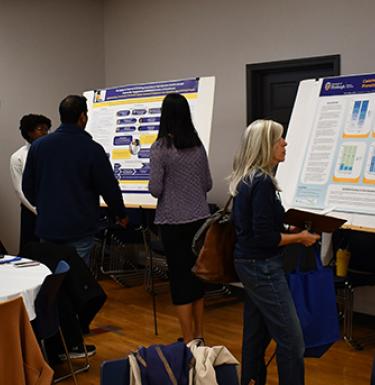
PulseNet identifies and stops foodborne illness outbreaks. Health care needs something similar
Alexander Sundermann, assistant professor of epidemiology, highlights the existence of PulseNet, a robust system for detecting foodborne outbreaks, and contrasts it with the lack of a similar system for tracking infections in healthcare settings.
Data Justice Project aims to improve lives of Black Pittsburghers
“Now our focus has shifted from covid to broader social determinants of health, thinking about neighborhoods, neighborhood change, population change and the built environment,” Professor of Epidemiology, Tiffany Gary-Webb said.
Event promotes school-wide practice projects
Sixteen graduate students from four departments at the School of Public Health took part in the first-ever Public Health Practice Showcase held Friday, Nov. 15, at the Community Engagement Center in the Hill District.
Study: Racism and sexism keeps Black moms from losing pregnancy weight
The finding flies in the face of a culture of “individual responsibility” around maternal health, said Dara Méndez, associate professor of epidemiology and associate director of the Center for Health Equity.
Allegheny County Executive announces new Board of Health appointments
Dara D. Méndez, PhD, MPH, associate professor of epidemiology and associate director of the Center for Health Equity, has been included in a group of eight new members appointed to the Allegheny County Board of Health.
Quality cholesterol boost – a menopause must
HDL helps reduce inflammation and supports healthy blood vessel function, which is crucial for brain health and development,” explains Samar R El Khoudary, professor of epidemiology.
Pitt Public Health honors alumni at awards ceremony
The University of Pittsburgh School of Public Health will recognize seven alumni for their outstanding service to the field of public health at an awards ceremony on Nov. 22.
Experiences of discrimination linked to postpartum weight retention
“Beyond individual choices and behavior, we have to account for an individual's environment, because that can have an impact on health, too,” said lead author Dara Méndez, Ph.D., M.P.H., associate professor of epidemiology and associate director of the Center for Health Equity.
Reducing sedentary behavior may lower clinical fracture risk for older men
“Older adults are told to get sufficient sleep and exercise regularly, but guidelines lack detail about an optimal 24-hour day that includes both activities,” Lauren Roe, aging T32 predoctoral fellow in the department of epidemiology.
Student Spotlight: John Tukakira
Get to know Epidemiology MPH student ambassador John Tukakira.
Jean Nachega: collaborating for research on mpox in Africa
“Most of the research grants I'm currently writing are focused on this mpox epidemic because I want to contribute in any way I can," says Associate Professor of Epidemiology Jean Nachega.
EMBRACE Center awarded $13 mil to improve Black birthing outcomes
“Each component of the EMBRACE center is co-lead by community partners or a community clinician,” says Associate Professor of Epidemiology Dara Méndez.
New community partnership targets intimate partner violence
Dara Mendez, PhD, MPH, associate professor of epidemiology, is coprincipal investigator on a new R01-funded study targeting intimate partner violence (IPV) during the perinatal period.
HDL quality, not quantity, contribute to the first sign of Alzheimer’s disease in women
“That’s the good news in this developing picture of brain health and the ‘not-so-good-after-all’ cholesterol,” said Professor of Epidemiology Samar El Khoudary.